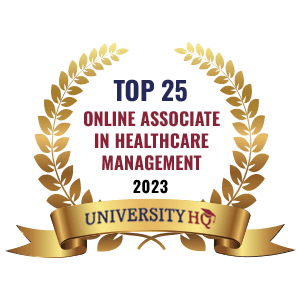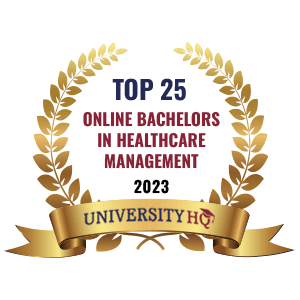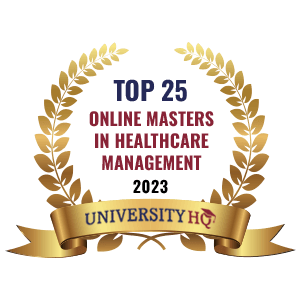What is Healthcare Management?
Mississippi is home to a vibrant and diverse economy that may be small, but it’s very important. It's still one of our more agriculturally based states, but it also has a strong presence in fields such as professional and business services, finance and insurance, and transportation. Meanwhile, Mississippi is our top producer of catfish, ranks third for cotton production, and produces much of the poultry, eggs, and dairy that hit our plates on a daily basis.
A healthcare manager is a professional who works on the administrative and managerial side of healthcare. They may work under titles such as nurse supervisor, hospital administrator, or other industry-specific monikers. This is because, while their positions may look like some similar non-healthcare jobs, the industry has specific attributes that distinguish it from other businesses.
One chief difference is that healthcare managers tend to work in hospitals, clinics, or small medical practices. They must work under the rules and regulations that govern healthcare on a national and state-specific basis. They may also need to work over the weekend or at night, especially if they work in the 24-7 hospital environment.
While many healthcare managers work side-by-side with clinical providers, others work in offices that are far removed from patients. For instance, every hospital needs a human resources department, information technology, and operations management. However, though these health administration professionals may not have hands-on interactions with patients, they all are working to ensure the very best care possible.

Featured Online Programs
Online Healthcare Management Education in Mississippi
Mississippi's economy is led by its manufacturing sector, which brings in over $18 billion in annual revenue. This economic strength began in the 1930s, when Mississippi became the pioneer in state-sponsored economic development after the entire region had been ravaged by the Great Depression. These days, Mississippi still lures northern and foreign manufacturing concerns with tax incentives, the lowest cost of living in the nation, and a regulatory atmosphere that is conducive to business owners' goals.
The Mississippi economy also relies heavily on its real estate sector, #2 statewide, which generates $12 billion in annual revenues. Education, social services, and healthcare collectively enter the #3 spot in the state economy, generating $10 billion annually and ranking 36th nationwide. This is fairly common as this super sector often ranks in the top five industrial sectors among US states.
Since healthcare is such a large part of the Mississippi economy, state legislators are keen to support academic programs that create new health administration professionals. After all, the field needs new ideas and young energy to keep vital and thriving. The state ensures that there are strong healthcare administration degree programs at the associate, bachelor’s, and master’s level. There are even doctorate degree programs for healthcare experts.
College and university faculty members strive to utilize the state resources in ways that support student outcomes. They seek to recruit top healthcare administration faculty from schools nationwide. They seek out both top scholars who hold doctorate healthcare management degrees and local experts who hold an MHA or MBA. Those with a master’s degree can teach at the undergraduate level and may find full-time positions with a Mississippi community college.
Online Associates (AS)

An associate healthcare management, health services administration, or health administration degree is a great foundation for a successful healthcare career. A two-year associate degree from a Mississippi community college introduces students to the fundamental principles of health services administration while helping them build strong soft skills, too. An associate degree makes great sense for many other reasons, though it might be difficult to find a degree focused on health services administration. If you can't find one of these, then you might earn a degree in business administration instead.
One of the chief advantages of an associate health administration degree is the cost. Mississippi's community colleges charge far less per credit hour than their four-year peers. This means that when students begin their four-year bachelor’s healthcare administration degree in a community college, their first two years come in at a significant discount. Thus, these savvy students can reduce their overall net costs. Some may think that this means that the educational value is also low, but this is far from the truth. Community colleges tend to feature small class sizes and the instructors are just as qualified and effective as instructors and professors in any four-year institution.
Find Your Online Healthcare Management Program
Online Bachelors (BS)

Perhaps the best training for a career in health administration is a bachelor’s degree in healthcare administration. Recruiters like to see that candidates have completed a full bachelor’s degree program. This is because students in four-year programs have an opportunity to dive deep into specific areas of healthcare administration. They might focus on topics such as healthcare informatics, administration, or human resources, for instance. Further, a bachelor’s degree offers more opportunities to broaden one's knowledge base. These degrees may offer courses in healthcare marketing, public health, health policy, the American healthcare delivery system, environmental health, etc. and prepare students for various health related professions.
During a bachelor’s degree, students can enhance their healthcare education with courses in related fields such as mathematics, statistics, or information technology. When students broaden their scope, they become more effective, adaptable employees. Some even focus on seemingly unrelated fields, such as public relations or technical writing. Both of these fields can be vital in the healthcare arena. Every hospital needs a PR team, and technical writers are always needed to create informative, helpful documents for a variety of audiences.
Online Masters (MS)

A master’s health services administration degree is where careers really take off. Employers often provide tuition reimbursement, raises, and promotions for their workers who choose to advance their degrees. This makes the decision to enroll in a graduate healthcare degree program very easy. However, the work is not easy, and choosing a program isn't always clear-cut.
Healthcare professionals may find that they have a few options. The most obvious choice would be to enroll in an MBA program that offers a concentration in healthcare administration. That would be pretty cut-and-dried plan, except that there are also master’s of healthcare administration degrees (MHA) that focus solely on healthcare and health policy. Then there are dual MBA degree programs.
A dual MBA program is intensive and will likely require that students cease working while they complete the degree(s). These programs combine two master’s degrees into a single program, enabling students to complete two graduate programs in three years. For healthcare professionals, one great option is to combine a Master of Science in Healthcare Administration with an MBA that concentrates in a healthcare or business field that will inform their career aspirations. For instance, an MBA concentration in corporate finance may enable a move into investment banking with a focus on healthcare.
Online Doctorate (PhD)
A PhD in healthcare management is not always what recruiters are looking for when they seek new employees. This degree is often considered to be too intellectual and focused too much on theory over practice. However, that may be changing in light of the fact that so many health administration professionals are earning master’s healthcare degrees. These degrees in Mississippi may focus on business administration as it is applied to the healthcare industry, health policy, etc.
Still, the primary use of a doctorate degree will probably be in academia. A PhD opens the door to a full-time tenure track position. Thus, this is a degree track that should be reserved for those who are primarily interested in researching and teaching their findings to undergraduate and graduate students. There may also be positions for research faculty who can earn tenure to continue their research projects. They must also seek, and win, grants that fund their positions. This work may also lead to a position in a health administration consulting firm.
Become a Healthcare Manager in Mississippi
Healthcare is one of the largest industries in the nation. Economists often lump it in with education and social services when assessing a state's top industrial sectors, but it still consistently ranks in the top five industries. Mississippi ranks this super sector third, and reports revenues of $10 billion in recent years. For this reason, and others, many Mississippi students may be interested in a career in healthcare management. On top of that, many providers on the clinical side choose to shift into hospital administration or health services administration.
Becoming a healthcare manager in Mississippi is relatively straightforward, but everyone is sure to forge their own path. One of the first steps to success in healthcare administration is a college degree. Those who start with an associate degree may find that their community college doesn't offer a health services administration focus, but that's not a huge hurdle. At the associate degree level, students may choose to major in a related field such as accounting, human resources management, or business administration and then choose to focus their job search on healthcare facilities who need workers in those areas.
Find Online Healthcare Management Programs
When it comes to a bachelor’s degree, students should certainly focus on a program that exclusively focuses on healthcare. After all, there are many regulations that govern the industry, and students will need to learn the intricacies of their chosen industry. They might also augment their work with a minor concentration in a related field such as ethics (especially medical ethics), accounting, or information technology. They might also look for legal studies courses that will inform their pursuit of healthcare as a career.
During a bachelor’s healthcare management degree program, students should also look for opportunities to learn by doing. This includes experiential learning opportunities such as internships. These courses are guided by faculty members and on-site experts. Students can thus gain real insights into how hospitals, clinics, and small medical practices are run day-to-day. They may also learn more about how Mississippi governs its healthcare infrastructure. For instance, Mississippi may have special guidelines for how Medicare payments are allocated.
Students and working professionals alike should also consider returning to school for a master’s health services administration degree. A Master of Healthcare Administration is a great choice, though some may choose an MBA with a concentration in healthcare administration. Nevertheless, a master’s degree in a focused, relevant field will likely lead to a higher salary, promotions, and long-term success generally.
Potential Careers for Healthcare Management Graduates
- Business Administrative Support Specialist
This is an entry-level position that can serve as a springboard to great success in healthcare administration. Support specialists may not need a specific degree, but an associate degree in health administration will certainly help. Duties for this job may include typing reports, creating PowerPoint presentations, and fielding calls from a variety of people. - Medical Secretary
This is a specialized support position that requires a good deal of medical knowledge. Medical secretaries may need skills in medical transcription, medical coding, and proper filing for medical records. Medical secretaries can also make good use of strong tech skills and familiarity with healthcare informatics. - Patient Service Representative
This is a social work position that assists patients with their healthcare journey. Many patients are unfamiliar with medical procedures and may not know when to seek a second opinion. A PSR helps patients navigate the healthcare system so that they are comfortable and receive the best possible care. - Healthcare Department Administrator
This position is often found in hospitals where they oversee a specific part of the hospital infrastructure. Some may oversee operations, such as the cleaning and maintenance teams. Others might manage the informatics team. Each department in a hospital needs management, so this position surely needs a degreed individual. - Hospice Administrator
Hospice clinics require administrators to oversee the operations and daily business. The top hospice administrator may help with intake and even help to console family members as their loved one approaches their final day. This position demands that professionals hold at least a bachelor’s healthcare administration degree, if not a master of healthcare administration. - Healthcare Consultant
Much like the for-profit corporations, healthcare systems need consultants to review their management, finances, and information technology. A healthcare consultant may have an MHA degree or an MBA, but they may also have significant experience in the field. Some former healthcare CEOs, for instance, take up a second career in healthcare consultation. - Chief Compliance Officer
Since healthcare is an industry that is fraught with regulations, it's vital that each healthcare system employs at least one compliance officer. These healthcare professionals are knowledgeable of all applicable laws, and they keep their eye on new legislation. A compliance officer ensures that each part of their hospital is following the law. - Chief Executive Officer
These professionals sit at the very top of any health system's organizational chart. The CEO oversees the entire operation and is responsible for setting the tone for new development. The CEO reports to the board of directors and usually has at least an MBA. A CEO in a health system may also hold an MHA. - Physician Practice Manager
Small medical practices require strong administrative support. That includes a practice manager. These healthcare professionals will need a bachelor’s healthcare administration degree and experience. Often, hospital administration professionals transition to a physician’s practice where they can take on more responsibility.
Search All Programs
